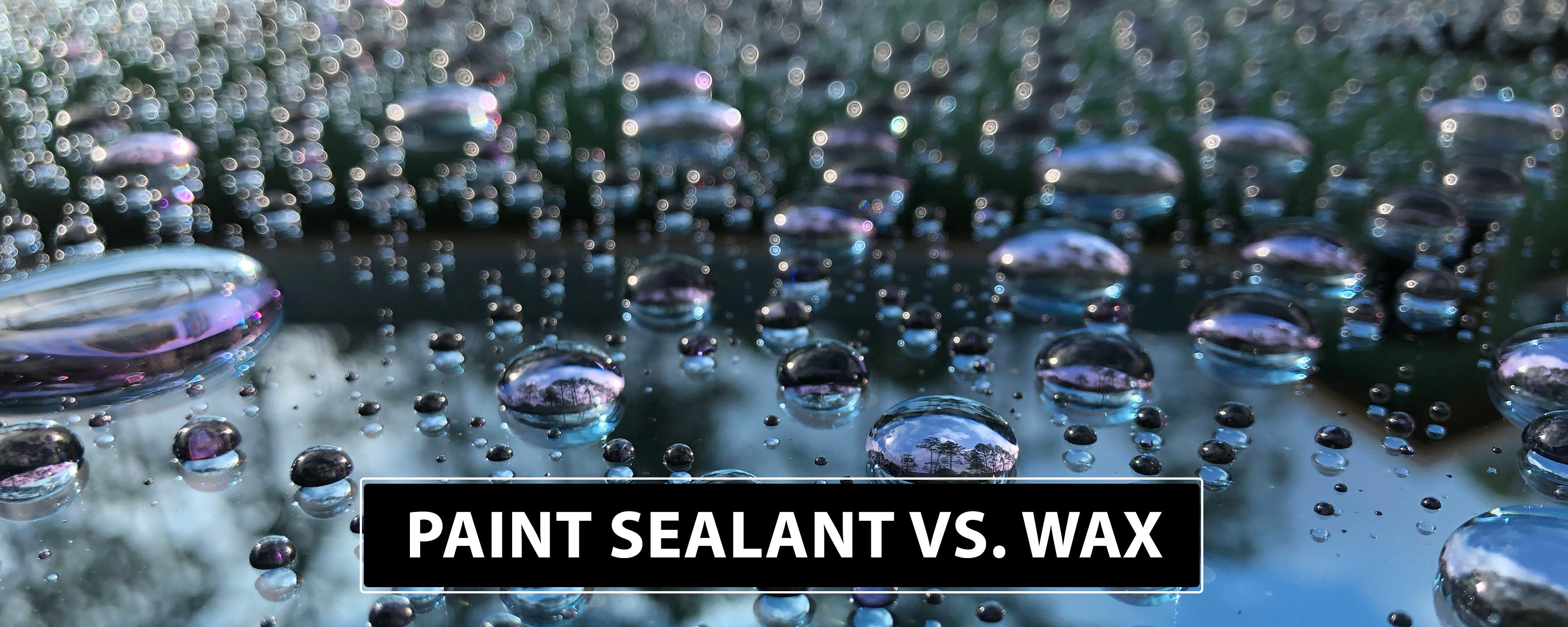
There’s a never-ending debate about what type of paint protection is best for your vehicle. The detailing industry is ultra-competitive when it comes to who has the best products for the do-it-yourself application of paint protection products, and we’re here to explain the differences in paint sealant versus wax and which one is the best.
A paint sealant is a product composed of engineered formulations that may combine polymers, resins, petroleum components, and other elements that are designed to bond and protect surfaces. Many trusted and proven paint sealants utilize advanced technologies, so they last a long time, are durable, resist UV rays, and have hydrophobic properties to ward off water and harsh outside elements.
Sealants often form hard glass-like protective barriers that separate the paint surface or clear-coat surface from elements. Many sealants prove to be safe for application to multiple surfaces, not just painted or clear-coated surfaces.
Some sealants have cleaning agents that provide an unsurpassed versatility to the application, where they may act as a quick detailer spray. Moreover, sealants may act as an all-in-one product saving you time and money in application versus applying different compounds that only perform one action.
Pros
Paint sealant products last a lot longer than wax applications, often lasting for several months, whereas wax may only last for a few weeks. Additionally, paint sealants are generally easier to apply and come in an easy spray-liquid form. By coming in a liquid formula, most paint sealers can be applied to multiple surfaces without the worry of leaving behind an ugly residue or requiring extra, time-consuming buffing.
Paint sealers often include many technologies in one product that add durability, protection, and hydrophobic properties that shed water, dirt, dust, bugs, bird poo, and road grime hence leaving your vehicle cleaner longer. While wax may offer many of these properties, the durability and lasting ability just isn’t there in wax products.
Cons
Some inferior paint sealers may contain somewhat harsh chemicals, and some resellers may not list the formulation as safe for application to certain surfaces. Consumers must beware of some inferior paint sealers that contain these abrasives or VOCs (volatile organic compounds) that could ultimately cause damage or micro-scratches on certain surfaces. Finding a good water-based paint sealer is a good idea as most prove to be safe to apply to multiple surfaces and are also environmentally friend. Also, some paint sealers do not enhance the glossiness or shine of surfaces as much as most wax products.
Lastly, some inferior paint sealers may not last as long as they claim, requiring you to buy more product and spend extra time and money. While most paint sealers are supposed to last longer than wax products, questionable resellers often sell products that are watered down or contain chemicals that break down quickly, where they prove to be ineffective in their protection and durability factors.
Wax is fundamentally more of a natural product when compared to paint sealants. Many wax products are harvested from the Copernicia prunifera (Carnauba) palm tree, which is where many waxes get the name Carnauba from. While Carnauba is the primary formula of many wax products, some come in a variety of grades, refinements, and purifications and can be blended with oils or other types of wax, such as beeswax.
Wax proves to be durable for short periods of time and can resist elements through a natural hydrophobicity. Wax often comes in a paste solid that is applied through steps where additional buffing off a glazed product is required. Wax is known to provide the best enhancement of painted or clear-coated surfaces in many cases but may only last for weeks, while many paint sealers last much longer.
Pros
Wax is known to better enhance the look of a surface than that of many paint sealants. Wax improves the gloss and visible shine of most surfaces upon proper application. Wax is usually not as harsh as some inferior paint sealants because wax uses more natural ingredients, while many sealers utilize artificial elements.
Wax may cost less than paint sealers allowing consumers to perform many wax applications for less. However, because wax may not last as long as paint sealers, the cost factor could equal out depending on how often a vehicle is washed or exposed to elements on the road.
Cons
Again, wax doesn’t last nearly as long as paint sealers proving to wear off in weeks instead of lasting for months with a trusted paint sealer product.
Wax is usually difficult to apply, requiring many steps. Most wax products require an initial application and then waiting for the wax to dry or flash. Then, such wax products require extensive buffing to remove the dried flashing.
Wax usually cannot be applied to different surface types, which greatly limits the use of wax to painted or clear-coated surfaces. Moreover, wax leaves behind an unsightly residue on other surfaces and may get caught in cracks and crevasses, causing a mess that requires time-consuming and meticulous cleaning/detailing.
Ultimately, it is up to a consumer to decide if wax or a paint sealer is right for them. In some cases, garaged show cars will benefit more from meticulous detailing and a wax product for an enhanced shine. However, some proven and long-lasting paint sealers have added agents and technologies that also enhance shine and gloss. The best approach to take is to do your homework and look at reviews of either product. Go with the one that has a proven track record!

We want you to be 100% satisfied with everything you buy from TopCoat. And if you’re not entirely happy with your purchase we will refund your money in full, or exchange the goods. All we ask is that you contact our customer services and then return the products back to us.